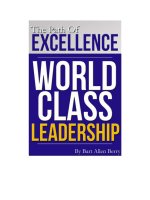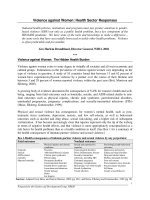Business Joining the Coalition to End Violence against Women
Bạn đang xem bản rút gọn của tài liệu. Xem và tải ngay bản đầy đủ của tài liệu tại đây (127.07 KB, 2 trang )
Business Joining the Coalition to End Violence against Women
Programs and Actions from the Workplace to the Community
The United Nations, Governments and international institutions, joining with the leading
advocacy of civil society and women’s organizations, increasingly recognize the cost and
consequence of the pandemic of violence against women. Taking effective action and
building influential stakeholders’ coalitions involves all sectors of society. The Women’s
Empowerment Principles – Equality Means Business calls attention to the role that the
private sector can positively play to address gender-based violence, establishing workplaces
where sexual harassment and violence against women are not tolerated. The efforts that
some companies are taking, extend beyond the workplace to the communities where their
workers come from and go back to every day.
Here are some examples from WEPs companies that highlight these policies,
practices and programmes:
An influential global technology company based in India (HCL, India) established a zero
tolerance policy against sexual harassment at work and implements policies that ensure
employees a safe and secure work environment. But what if there is an incident? Is it safe
to report it? The company has a “whistle blower” policy to protect sources, an ethics
committee and bodies that quickly review grievances.
Another company (Infosys Limited, India) provides self-defense classes on its campus for
women; special transportation, including a security guard if necessary, to make sure that
women reach home safely on days when they are working late to meet client deadlines.
They keep the issue on the front burner by using email and business newsletters to send the
message that this is a safe and harassment free workplace for everyone.
A large Brazilian company (ITAIPU, Brazil) took the step to create a shelter for women
survivors of domestic violence, along with a referral and information Support Center. The
business cooperates closely with the Government to strengthen its National Place of Action.
The leadership sets the tone by including men in its Management Committee of Gender
Equality and participates in the White Ribbon Campaign, sending a clear public message
that violence against women is everyone’s business.
Demonstrating that girl children have every right, a company (JSL, India) launched a
special “Save the Girl Child” initiative to empower pregnant women with knowledge about
healthy pregnancy, safe delivery and infant care. In addition, the program addresses the
problem of female feticide, using its leadership, to bolster the law, by sending the
unambiguous message that girls matter.
A large garment company’s programme (MAS, Sri Lanka) established indicators of
success on addressing violence against women that include: total number of incidents of
sexual harassment and action taken, along with the number of initiatives and participants in
activities that provide information, education and training on sexual harassment in the place.
The company also conducts gender sensitive training for Managers and Executives, working
with men to reduce gender-based violence at the workplace. Overall, the leadership seeks
to achieve a corporate culture where women are treated fairly and their human rights
respected, even in the midst of a national culture where women and girls face endemic
discrimination and violence.
A large cosmetics company (Avon, US) dedicated to the empowerment of women globally
makes the company’s mission to end domestic violence. In 2004 they launched “Speak Out
Against Domestic Violence”, an initiative to build awareness, educate, and improve
prevention and direct service programs with focus on prevention and victim support
programs. Moreover the company established the $2 million “Global Believe Fund” to
support women's domestic violence shelters and agencies around the world, created to draw
attention to the alarming lack of adequate services for women and children who are victims
of domestic violence. Through their global philanthropy they donated almost $50 million to
support the cause in nearly 50 countries and by end of 2012, in the U.S. alone, provided
more than $33 million for the domestic violence cause.
According to the Acid Survivors Foundation, Bangladesh has the highest reported
incidence of acid violence in the world with 46 per cent of the perpetrators being someone
known to the victim. An acid attack takes place every two days in this – South Asian country.
This Bangladesh (TeleConsult Group, Bangladesh & US) based company Management
Consultancy firms included in its business plan a component to promote women’s
empowerment by supporting skills development and Information and Communication
Technologies training for women. This incorporates two diverse goals: starting a phonebased crisis support centre, as well as generating employment opportunities for acid attack
survivors. There are more than 1,000 women who have been trained since 2011 and among
the 35 call centre staff members.
Another WEPs-affiliated company that is working to end violence against women is
Turkey’s leading technology and communications company (Turkcell, Turkey). It supports the
“Zero Tolerance for Violence against Women” campaign of the Ministry of Family and Social
Policies by integrating mobile technology and mass communication capabilities to empower
women in daily social life. For example, they are working on a new mobile technology with
the Turkish Family and Social Policy Ministry that aims to combat domestic violence by
providing “women panic buttons” which transfer calls directly to the 155 police emergency
line.









